Positive Psychology Research: Character Traits and Human Behavior
VerifiedAdded on 2023/06/15
|13
|3566
|278
Project
AI Summary
This research project investigates the impact of positive psychology on human behavior, focusing on character traits and their influence. It employs a qualitative approach, utilizing primary data collected through interviews with five respondents and secondary data from peer-reviewed articles and scholarly journals. The study adopts a grounded theory approach and uses thematic analysis to interpret the data, identifying patterns and meanings related to positive psychology's effects. The research aims to understand how positive psychology can improve self-esteem, relationships, and overall quality of life by examining gratitude, social connections, and personal values. The data analysis involves thematic analysis and data triangulation techniques to address the research questions effectively. The findings contribute to understanding the role of positive psychology in fostering well-being and resilience.
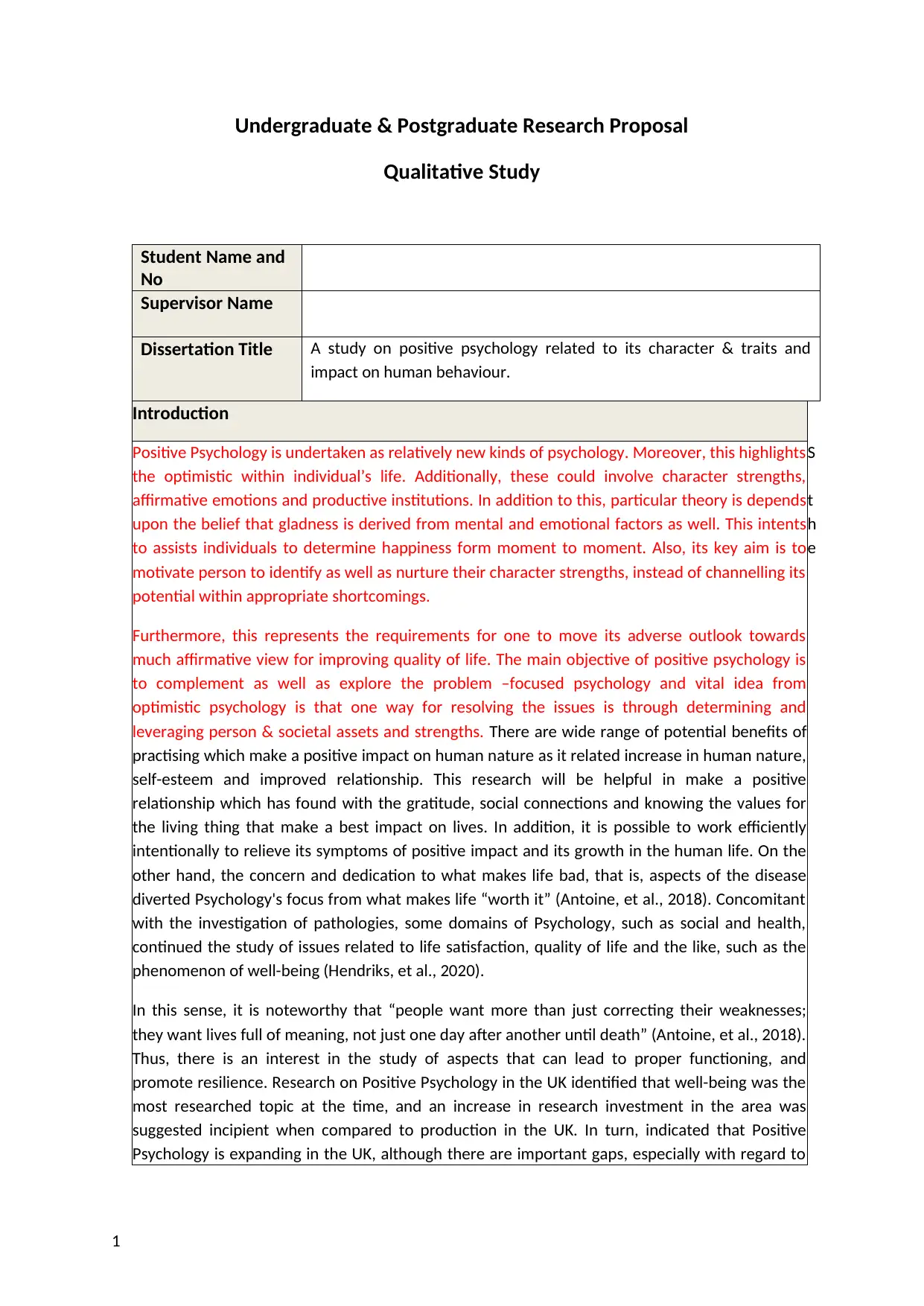
Undergraduate & Postgraduate Research Proposal
Qualitative Study
Student Name and
No
Supervisor Name
Dissertation Title A study on positive psychology related to its character & traits and
impact on human behaviour.
Introduction
Positive Psychology is undertaken as relatively new kinds of psychology. Moreover, this highlights
the optimistic within individual’s life. Additionally, these could involve character strengths,
affirmative emotions and productive institutions. In addition to this, particular theory is depends
upon the belief that gladness is derived from mental and emotional factors as well. This intents
to assists individuals to determine happiness form moment to moment. Also, its key aim is to
motivate person to identify as well as nurture their character strengths, instead of channelling its
potential within appropriate shortcomings.
Furthermore, this represents the requirements for one to move its adverse outlook towards
much affirmative view for improving quality of life. The main objective of positive psychology is
to complement as well as explore the problem –focused psychology and vital idea from
optimistic psychology is that one way for resolving the issues is through determining and
leveraging person & societal assets and strengths. There are wide range of potential benefits of
practising which make a positive impact on human nature as it related increase in human nature,
self-esteem and improved relationship. This research will be helpful in make a positive
relationship which has found with the gratitude, social connections and knowing the values for
the living thing that make a best impact on lives. In addition, it is possible to work efficiently
intentionally to relieve its symptoms of positive impact and its growth in the human life. On the
other hand, the concern and dedication to what makes life bad, that is, aspects of the disease
diverted Psychology's focus from what makes life “worth it” (Antoine, et al., 2018). Concomitant
with the investigation of pathologies, some domains of Psychology, such as social and health,
continued the study of issues related to life satisfaction, quality of life and the like, such as the
phenomenon of well-being (Hendriks, et al., 2020).
In this sense, it is noteworthy that “people want more than just correcting their weaknesses;
they want lives full of meaning, not just one day after another until death” (Antoine, et al., 2018).
Thus, there is an interest in the study of aspects that can lead to proper functioning, and
promote resilience. Research on Positive Psychology in the UK identified that well-being was the
most researched topic at the time, and an increase in research investment in the area was
suggested incipient when compared to production in the UK. In turn, indicated that Positive
Psychology is expanding in the UK, although there are important gaps, especially with regard to
S
t
h
e
1
Qualitative Study
Student Name and
No
Supervisor Name
Dissertation Title A study on positive psychology related to its character & traits and
impact on human behaviour.
Introduction
Positive Psychology is undertaken as relatively new kinds of psychology. Moreover, this highlights
the optimistic within individual’s life. Additionally, these could involve character strengths,
affirmative emotions and productive institutions. In addition to this, particular theory is depends
upon the belief that gladness is derived from mental and emotional factors as well. This intents
to assists individuals to determine happiness form moment to moment. Also, its key aim is to
motivate person to identify as well as nurture their character strengths, instead of channelling its
potential within appropriate shortcomings.
Furthermore, this represents the requirements for one to move its adverse outlook towards
much affirmative view for improving quality of life. The main objective of positive psychology is
to complement as well as explore the problem –focused psychology and vital idea from
optimistic psychology is that one way for resolving the issues is through determining and
leveraging person & societal assets and strengths. There are wide range of potential benefits of
practising which make a positive impact on human nature as it related increase in human nature,
self-esteem and improved relationship. This research will be helpful in make a positive
relationship which has found with the gratitude, social connections and knowing the values for
the living thing that make a best impact on lives. In addition, it is possible to work efficiently
intentionally to relieve its symptoms of positive impact and its growth in the human life. On the
other hand, the concern and dedication to what makes life bad, that is, aspects of the disease
diverted Psychology's focus from what makes life “worth it” (Antoine, et al., 2018). Concomitant
with the investigation of pathologies, some domains of Psychology, such as social and health,
continued the study of issues related to life satisfaction, quality of life and the like, such as the
phenomenon of well-being (Hendriks, et al., 2020).
In this sense, it is noteworthy that “people want more than just correcting their weaknesses;
they want lives full of meaning, not just one day after another until death” (Antoine, et al., 2018).
Thus, there is an interest in the study of aspects that can lead to proper functioning, and
promote resilience. Research on Positive Psychology in the UK identified that well-being was the
most researched topic at the time, and an increase in research investment in the area was
suggested incipient when compared to production in the UK. In turn, indicated that Positive
Psychology is expanding in the UK, although there are important gaps, especially with regard to
S
t
h
e
1
Paraphrase This Document
Need a fresh take? Get an instant paraphrase of this document with our AI Paraphraser
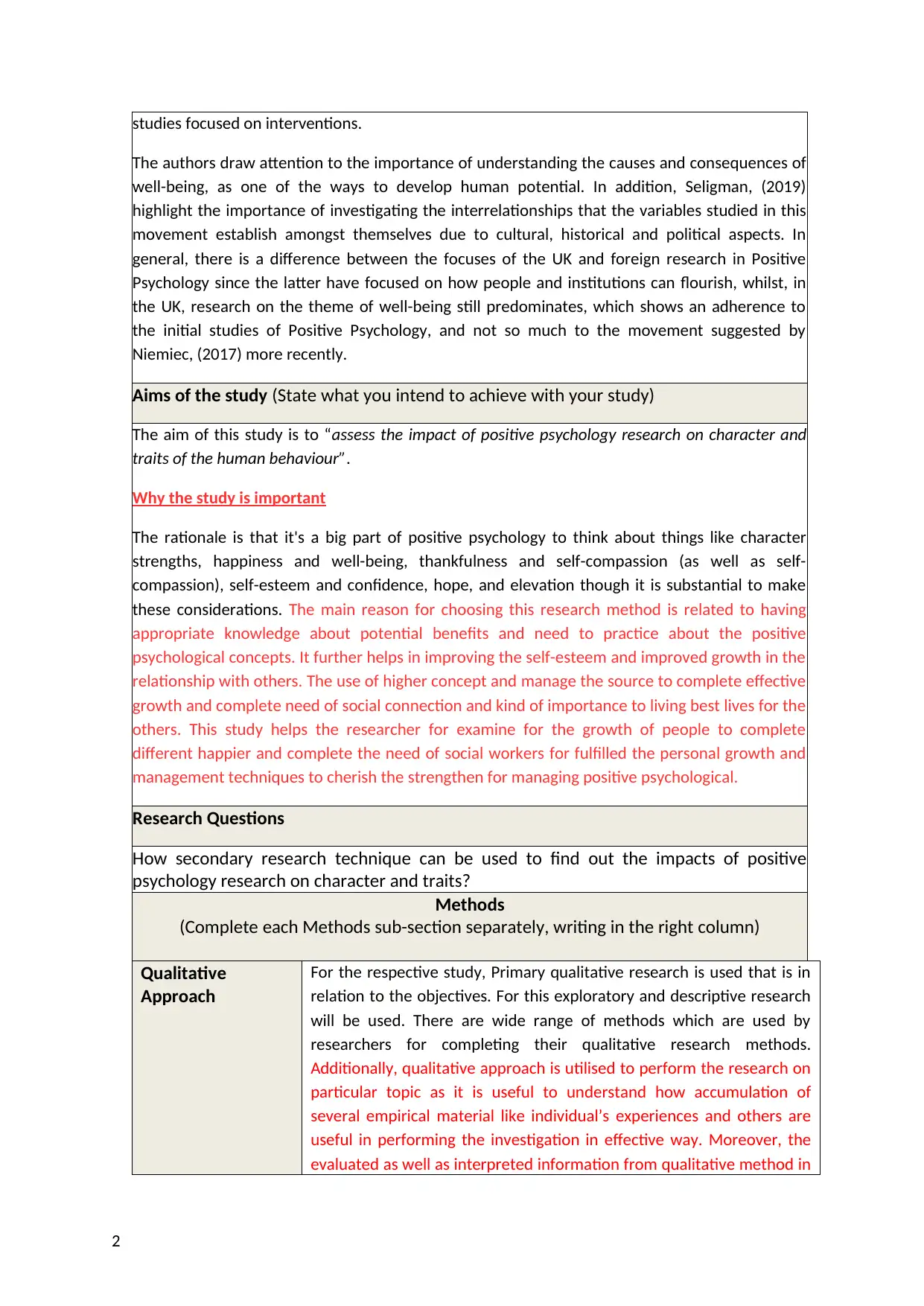
studies focused on interventions.
The authors draw attention to the importance of understanding the causes and consequences of
well-being, as one of the ways to develop human potential. In addition, Seligman, (2019)
highlight the importance of investigating the interrelationships that the variables studied in this
movement establish amongst themselves due to cultural, historical and political aspects. In
general, there is a difference between the focuses of the UK and foreign research in Positive
Psychology since the latter have focused on how people and institutions can flourish, whilst, in
the UK, research on the theme of well-being still predominates, which shows an adherence to
the initial studies of Positive Psychology, and not so much to the movement suggested by
Niemiec, (2017) more recently.
Aims of the study (State what you intend to achieve with your study)
The aim of this study is to “assess the impact of positive psychology research on character and
traits of the human behaviour”.
Why the study is important
The rationale is that it's a big part of positive psychology to think about things like character
strengths, happiness and well-being, thankfulness and self-compassion (as well as self-
compassion), self-esteem and confidence, hope, and elevation though it is substantial to make
these considerations. The main reason for choosing this research method is related to having
appropriate knowledge about potential benefits and need to practice about the positive
psychological concepts. It further helps in improving the self-esteem and improved growth in the
relationship with others. The use of higher concept and manage the source to complete effective
growth and complete need of social connection and kind of importance to living best lives for the
others. This study helps the researcher for examine for the growth of people to complete
different happier and complete the need of social workers for fulfilled the personal growth and
management techniques to cherish the strengthen for managing positive psychological.
Research Questions
How secondary research technique can be used to find out the impacts of positive
psychology research on character and traits?
Methods
(Complete each Methods sub-section separately, writing in the right column)
Qualitative
Approach
For the respective study, Primary qualitative research is used that is in
relation to the objectives. For this exploratory and descriptive research
will be used. There are wide range of methods which are used by
researchers for completing their qualitative research methods.
Additionally, qualitative approach is utilised to perform the research on
particular topic as it is useful to understand how accumulation of
several empirical material like individual’s experiences and others are
useful in performing the investigation in effective way. Moreover, the
evaluated as well as interpreted information from qualitative method in
2
The authors draw attention to the importance of understanding the causes and consequences of
well-being, as one of the ways to develop human potential. In addition, Seligman, (2019)
highlight the importance of investigating the interrelationships that the variables studied in this
movement establish amongst themselves due to cultural, historical and political aspects. In
general, there is a difference between the focuses of the UK and foreign research in Positive
Psychology since the latter have focused on how people and institutions can flourish, whilst, in
the UK, research on the theme of well-being still predominates, which shows an adherence to
the initial studies of Positive Psychology, and not so much to the movement suggested by
Niemiec, (2017) more recently.
Aims of the study (State what you intend to achieve with your study)
The aim of this study is to “assess the impact of positive psychology research on character and
traits of the human behaviour”.
Why the study is important
The rationale is that it's a big part of positive psychology to think about things like character
strengths, happiness and well-being, thankfulness and self-compassion (as well as self-
compassion), self-esteem and confidence, hope, and elevation though it is substantial to make
these considerations. The main reason for choosing this research method is related to having
appropriate knowledge about potential benefits and need to practice about the positive
psychological concepts. It further helps in improving the self-esteem and improved growth in the
relationship with others. The use of higher concept and manage the source to complete effective
growth and complete need of social connection and kind of importance to living best lives for the
others. This study helps the researcher for examine for the growth of people to complete
different happier and complete the need of social workers for fulfilled the personal growth and
management techniques to cherish the strengthen for managing positive psychological.
Research Questions
How secondary research technique can be used to find out the impacts of positive
psychology research on character and traits?
Methods
(Complete each Methods sub-section separately, writing in the right column)
Qualitative
Approach
For the respective study, Primary qualitative research is used that is in
relation to the objectives. For this exploratory and descriptive research
will be used. There are wide range of methods which are used by
researchers for completing their qualitative research methods.
Additionally, qualitative approach is utilised to perform the research on
particular topic as it is useful to understand how accumulation of
several empirical material like individual’s experiences and others are
useful in performing the investigation in effective way. Moreover, the
evaluated as well as interpreted information from qualitative method in
2
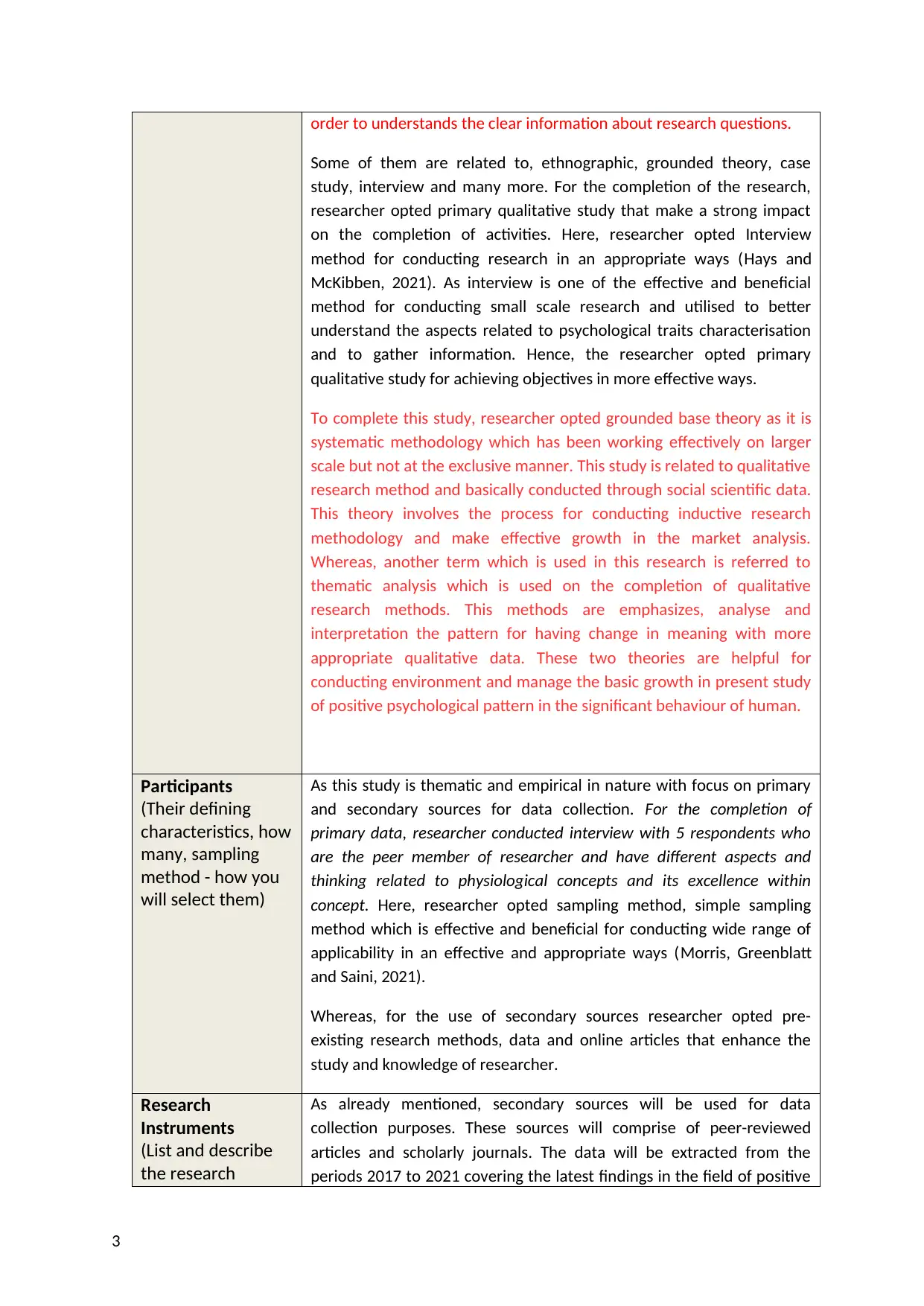
order to understands the clear information about research questions.
Some of them are related to, ethnographic, grounded theory, case
study, interview and many more. For the completion of the research,
researcher opted primary qualitative study that make a strong impact
on the completion of activities. Here, researcher opted Interview
method for conducting research in an appropriate ways (Hays and
McKibben, 2021). As interview is one of the effective and beneficial
method for conducting small scale research and utilised to better
understand the aspects related to psychological traits characterisation
and to gather information. Hence, the researcher opted primary
qualitative study for achieving objectives in more effective ways.
To complete this study, researcher opted grounded base theory as it is
systematic methodology which has been working effectively on larger
scale but not at the exclusive manner. This study is related to qualitative
research method and basically conducted through social scientific data.
This theory involves the process for conducting inductive research
methodology and make effective growth in the market analysis.
Whereas, another term which is used in this research is referred to
thematic analysis which is used on the completion of qualitative
research methods. This methods are emphasizes, analyse and
interpretation the pattern for having change in meaning with more
appropriate qualitative data. These two theories are helpful for
conducting environment and manage the basic growth in present study
of positive psychological pattern in the significant behaviour of human.
Participants
(Their defining
characteristics, how
many, sampling
method - how you
will select them)
As this study is thematic and empirical in nature with focus on primary
and secondary sources for data collection. For the completion of
primary data, researcher conducted interview with 5 respondents who
are the peer member of researcher and have different aspects and
thinking related to physiological concepts and its excellence within
concept. Here, researcher opted sampling method, simple sampling
method which is effective and beneficial for conducting wide range of
applicability in an effective and appropriate ways (Morris, Greenblatt
and Saini, 2021).
Whereas, for the use of secondary sources researcher opted pre-
existing research methods, data and online articles that enhance the
study and knowledge of researcher.
Research
Instruments
(List and describe
the research
As already mentioned, secondary sources will be used for data
collection purposes. These sources will comprise of peer-reviewed
articles and scholarly journals. The data will be extracted from the
periods 2017 to 2021 covering the latest findings in the field of positive
3
Some of them are related to, ethnographic, grounded theory, case
study, interview and many more. For the completion of the research,
researcher opted primary qualitative study that make a strong impact
on the completion of activities. Here, researcher opted Interview
method for conducting research in an appropriate ways (Hays and
McKibben, 2021). As interview is one of the effective and beneficial
method for conducting small scale research and utilised to better
understand the aspects related to psychological traits characterisation
and to gather information. Hence, the researcher opted primary
qualitative study for achieving objectives in more effective ways.
To complete this study, researcher opted grounded base theory as it is
systematic methodology which has been working effectively on larger
scale but not at the exclusive manner. This study is related to qualitative
research method and basically conducted through social scientific data.
This theory involves the process for conducting inductive research
methodology and make effective growth in the market analysis.
Whereas, another term which is used in this research is referred to
thematic analysis which is used on the completion of qualitative
research methods. This methods are emphasizes, analyse and
interpretation the pattern for having change in meaning with more
appropriate qualitative data. These two theories are helpful for
conducting environment and manage the basic growth in present study
of positive psychological pattern in the significant behaviour of human.
Participants
(Their defining
characteristics, how
many, sampling
method - how you
will select them)
As this study is thematic and empirical in nature with focus on primary
and secondary sources for data collection. For the completion of
primary data, researcher conducted interview with 5 respondents who
are the peer member of researcher and have different aspects and
thinking related to physiological concepts and its excellence within
concept. Here, researcher opted sampling method, simple sampling
method which is effective and beneficial for conducting wide range of
applicability in an effective and appropriate ways (Morris, Greenblatt
and Saini, 2021).
Whereas, for the use of secondary sources researcher opted pre-
existing research methods, data and online articles that enhance the
study and knowledge of researcher.
Research
Instruments
(List and describe
the research
As already mentioned, secondary sources will be used for data
collection purposes. These sources will comprise of peer-reviewed
articles and scholarly journals. The data will be extracted from the
periods 2017 to 2021 covering the latest findings in the field of positive
3
⊘ This is a preview!⊘
Do you want full access?
Subscribe today to unlock all pages.

Trusted by 1+ million students worldwide
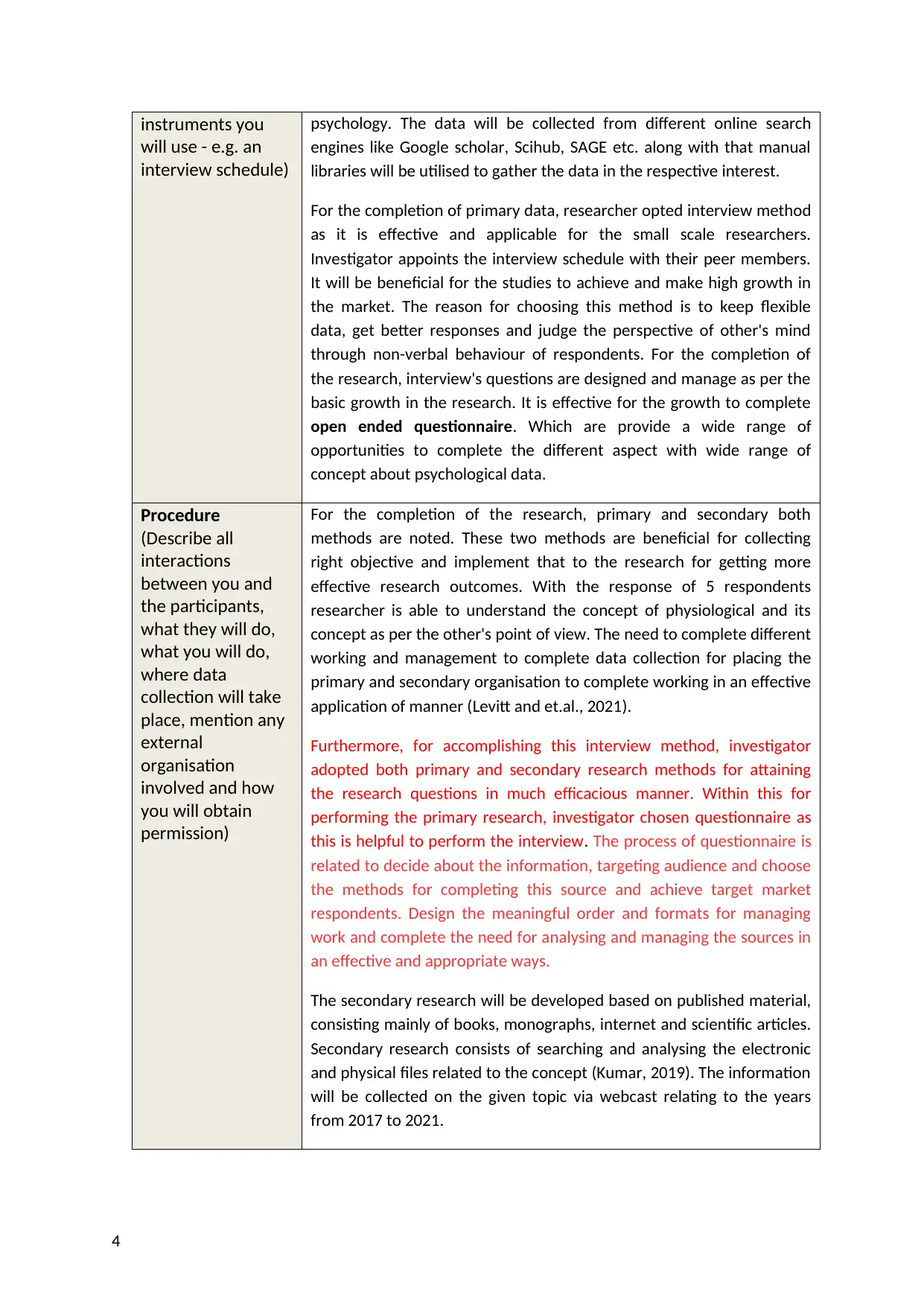
instruments you
will use - e.g. an
interview schedule)
psychology. The data will be collected from different online search
engines like Google scholar, Scihub, SAGE etc. along with that manual
libraries will be utilised to gather the data in the respective interest.
For the completion of primary data, researcher opted interview method
as it is effective and applicable for the small scale researchers.
Investigator appoints the interview schedule with their peer members.
It will be beneficial for the studies to achieve and make high growth in
the market. The reason for choosing this method is to keep flexible
data, get better responses and judge the perspective of other's mind
through non-verbal behaviour of respondents. For the completion of
the research, interview's questions are designed and manage as per the
basic growth in the research. It is effective for the growth to complete
open ended questionnaire. Which are provide a wide range of
opportunities to complete the different aspect with wide range of
concept about psychological data.
Procedure
(Describe all
interactions
between you and
the participants,
what they will do,
what you will do,
where data
collection will take
place, mention any
external
organisation
involved and how
you will obtain
permission)
For the completion of the research, primary and secondary both
methods are noted. These two methods are beneficial for collecting
right objective and implement that to the research for getting more
effective research outcomes. With the response of 5 respondents
researcher is able to understand the concept of physiological and its
concept as per the other's point of view. The need to complete different
working and management to complete data collection for placing the
primary and secondary organisation to complete working in an effective
application of manner (Levitt and et.al., 2021).
Furthermore, for accomplishing this interview method, investigator
adopted both primary and secondary research methods for attaining
the research questions in much efficacious manner. Within this for
performing the primary research, investigator chosen questionnaire as
this is helpful to perform the interview. The process of questionnaire is
related to decide about the information, targeting audience and choose
the methods for completing this source and achieve target market
respondents. Design the meaningful order and formats for managing
work and complete the need for analysing and managing the sources in
an effective and appropriate ways.
The secondary research will be developed based on published material,
consisting mainly of books, monographs, internet and scientific articles.
Secondary research consists of searching and analysing the electronic
and physical files related to the concept (Kumar, 2019). The information
will be collected on the given topic via webcast relating to the years
from 2017 to 2021.
4
will use - e.g. an
interview schedule)
psychology. The data will be collected from different online search
engines like Google scholar, Scihub, SAGE etc. along with that manual
libraries will be utilised to gather the data in the respective interest.
For the completion of primary data, researcher opted interview method
as it is effective and applicable for the small scale researchers.
Investigator appoints the interview schedule with their peer members.
It will be beneficial for the studies to achieve and make high growth in
the market. The reason for choosing this method is to keep flexible
data, get better responses and judge the perspective of other's mind
through non-verbal behaviour of respondents. For the completion of
the research, interview's questions are designed and manage as per the
basic growth in the research. It is effective for the growth to complete
open ended questionnaire. Which are provide a wide range of
opportunities to complete the different aspect with wide range of
concept about psychological data.
Procedure
(Describe all
interactions
between you and
the participants,
what they will do,
what you will do,
where data
collection will take
place, mention any
external
organisation
involved and how
you will obtain
permission)
For the completion of the research, primary and secondary both
methods are noted. These two methods are beneficial for collecting
right objective and implement that to the research for getting more
effective research outcomes. With the response of 5 respondents
researcher is able to understand the concept of physiological and its
concept as per the other's point of view. The need to complete different
working and management to complete data collection for placing the
primary and secondary organisation to complete working in an effective
application of manner (Levitt and et.al., 2021).
Furthermore, for accomplishing this interview method, investigator
adopted both primary and secondary research methods for attaining
the research questions in much efficacious manner. Within this for
performing the primary research, investigator chosen questionnaire as
this is helpful to perform the interview. The process of questionnaire is
related to decide about the information, targeting audience and choose
the methods for completing this source and achieve target market
respondents. Design the meaningful order and formats for managing
work and complete the need for analysing and managing the sources in
an effective and appropriate ways.
The secondary research will be developed based on published material,
consisting mainly of books, monographs, internet and scientific articles.
Secondary research consists of searching and analysing the electronic
and physical files related to the concept (Kumar, 2019). The information
will be collected on the given topic via webcast relating to the years
from 2017 to 2021.
4
Paraphrase This Document
Need a fresh take? Get an instant paraphrase of this document with our AI Paraphraser
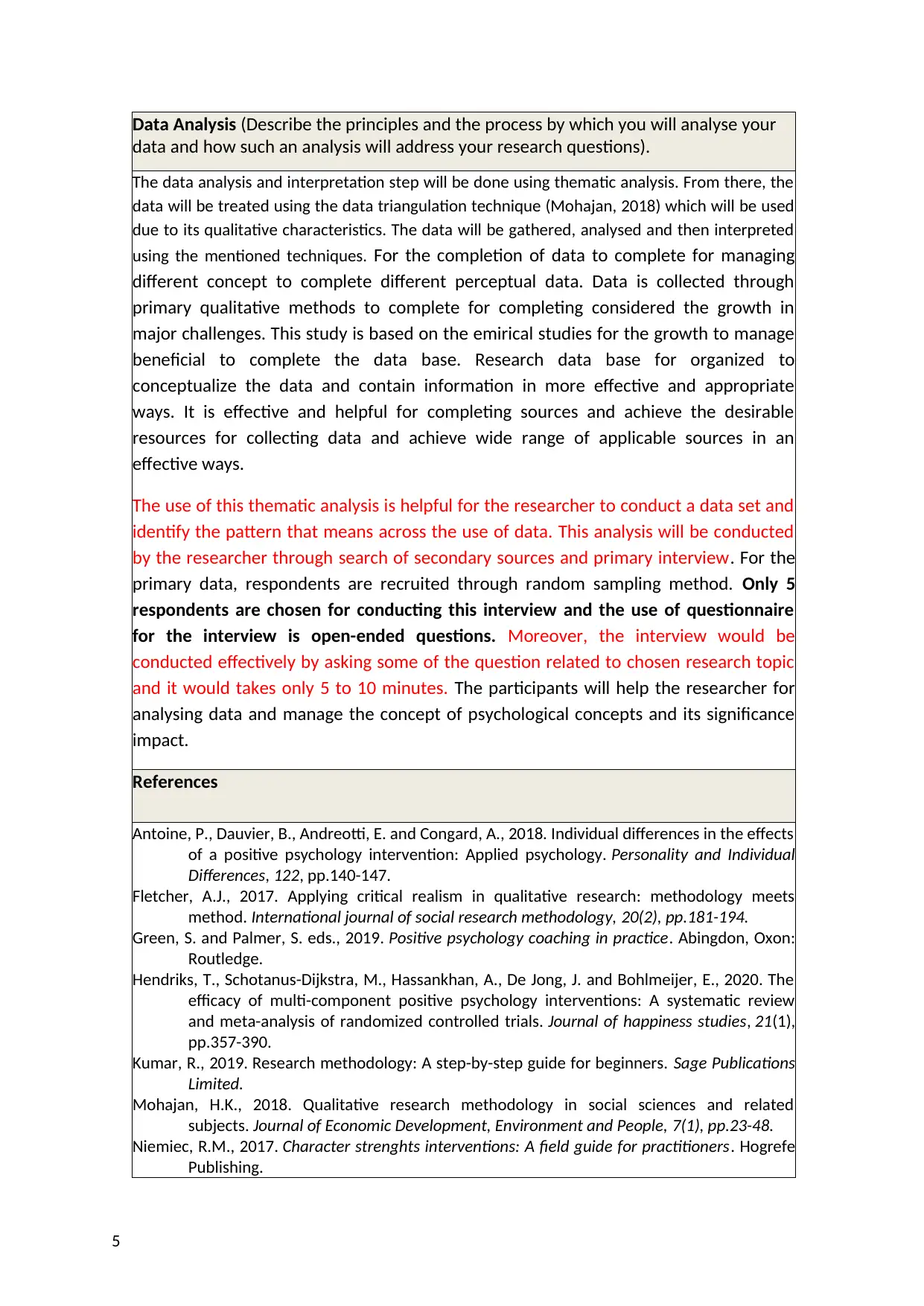
Data Analysis (Describe the principles and the process by which you will analyse your
data and how such an analysis will address your research questions).
The data analysis and interpretation step will be done using thematic analysis. From there, the
data will be treated using the data triangulation technique (Mohajan, 2018) which will be used
due to its qualitative characteristics. The data will be gathered, analysed and then interpreted
using the mentioned techniques. For the completion of data to complete for managing
different concept to complete different perceptual data. Data is collected through
primary qualitative methods to complete for completing considered the growth in
major challenges. This study is based on the emirical studies for the growth to manage
beneficial to complete the data base. Research data base for organized to
conceptualize the data and contain information in more effective and appropriate
ways. It is effective and helpful for completing sources and achieve the desirable
resources for collecting data and achieve wide range of applicable sources in an
effective ways.
The use of this thematic analysis is helpful for the researcher to conduct a data set and
identify the pattern that means across the use of data. This analysis will be conducted
by the researcher through search of secondary sources and primary interview. For the
primary data, respondents are recruited through random sampling method. Only 5
respondents are chosen for conducting this interview and the use of questionnaire
for the interview is open-ended questions. Moreover, the interview would be
conducted effectively by asking some of the question related to chosen research topic
and it would takes only 5 to 10 minutes. The participants will help the researcher for
analysing data and manage the concept of psychological concepts and its significance
impact.
References
Antoine, P., Dauvier, B., Andreotti, E. and Congard, A., 2018. Individual differences in the effects
of a positive psychology intervention: Applied psychology. Personality and Individual
Differences, 122, pp.140-147.
Fletcher, A.J., 2017. Applying critical realism in qualitative research: methodology meets
method. International journal of social research methodology, 20(2), pp.181-194.
Green, S. and Palmer, S. eds., 2019. Positive psychology coaching in practice. Abingdon, Oxon:
Routledge.
Hendriks, T., Schotanus-Dijkstra, M., Hassankhan, A., De Jong, J. and Bohlmeijer, E., 2020. The
efficacy of multi-component positive psychology interventions: A systematic review
and meta-analysis of randomized controlled trials. Journal of happiness studies, 21(1),
pp.357-390.
Kumar, R., 2019. Research methodology: A step-by-step guide for beginners. Sage Publications
Limited.
Mohajan, H.K., 2018. Qualitative research methodology in social sciences and related
subjects. Journal of Economic Development, Environment and People, 7(1), pp.23-48.
Niemiec, R.M., 2017. Character strenghts interventions: A field guide for practitioners. Hogrefe
Publishing.
5
data and how such an analysis will address your research questions).
The data analysis and interpretation step will be done using thematic analysis. From there, the
data will be treated using the data triangulation technique (Mohajan, 2018) which will be used
due to its qualitative characteristics. The data will be gathered, analysed and then interpreted
using the mentioned techniques. For the completion of data to complete for managing
different concept to complete different perceptual data. Data is collected through
primary qualitative methods to complete for completing considered the growth in
major challenges. This study is based on the emirical studies for the growth to manage
beneficial to complete the data base. Research data base for organized to
conceptualize the data and contain information in more effective and appropriate
ways. It is effective and helpful for completing sources and achieve the desirable
resources for collecting data and achieve wide range of applicable sources in an
effective ways.
The use of this thematic analysis is helpful for the researcher to conduct a data set and
identify the pattern that means across the use of data. This analysis will be conducted
by the researcher through search of secondary sources and primary interview. For the
primary data, respondents are recruited through random sampling method. Only 5
respondents are chosen for conducting this interview and the use of questionnaire
for the interview is open-ended questions. Moreover, the interview would be
conducted effectively by asking some of the question related to chosen research topic
and it would takes only 5 to 10 minutes. The participants will help the researcher for
analysing data and manage the concept of psychological concepts and its significance
impact.
References
Antoine, P., Dauvier, B., Andreotti, E. and Congard, A., 2018. Individual differences in the effects
of a positive psychology intervention: Applied psychology. Personality and Individual
Differences, 122, pp.140-147.
Fletcher, A.J., 2017. Applying critical realism in qualitative research: methodology meets
method. International journal of social research methodology, 20(2), pp.181-194.
Green, S. and Palmer, S. eds., 2019. Positive psychology coaching in practice. Abingdon, Oxon:
Routledge.
Hendriks, T., Schotanus-Dijkstra, M., Hassankhan, A., De Jong, J. and Bohlmeijer, E., 2020. The
efficacy of multi-component positive psychology interventions: A systematic review
and meta-analysis of randomized controlled trials. Journal of happiness studies, 21(1),
pp.357-390.
Kumar, R., 2019. Research methodology: A step-by-step guide for beginners. Sage Publications
Limited.
Mohajan, H.K., 2018. Qualitative research methodology in social sciences and related
subjects. Journal of Economic Development, Environment and People, 7(1), pp.23-48.
Niemiec, R.M., 2017. Character strenghts interventions: A field guide for practitioners. Hogrefe
Publishing.
5
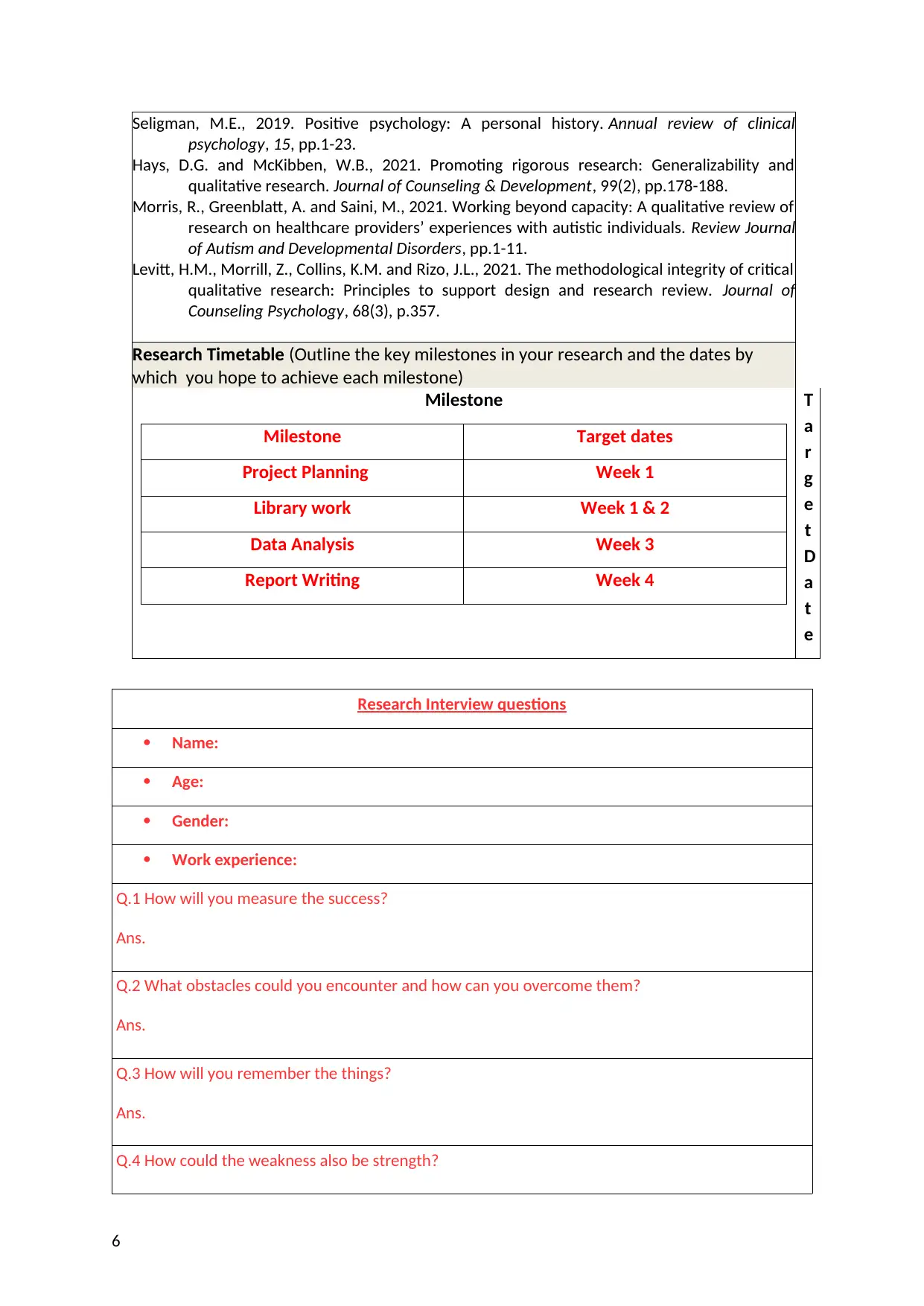
Seligman, M.E., 2019. Positive psychology: A personal history. Annual review of clinical
psychology, 15, pp.1-23.
Hays, D.G. and McKibben, W.B., 2021. Promoting rigorous research: Generalizability and
qualitative research. Journal of Counseling & Development, 99(2), pp.178-188.
Morris, R., Greenblatt, A. and Saini, M., 2021. Working beyond capacity: A qualitative review of
research on healthcare providers’ experiences with autistic individuals. Review Journal
of Autism and Developmental Disorders, pp.1-11.
Levitt, H.M., Morrill, Z., Collins, K.M. and Rizo, J.L., 2021. The methodological integrity of critical
qualitative research: Principles to support design and research review. Journal of
Counseling Psychology, 68(3), p.357.
Research Timetable (Outline the key milestones in your research and the dates by
which you hope to achieve each milestone)
Milestone
Milestone Target dates
Project Planning Week 1
Library work Week 1 & 2
Data Analysis Week 3
Report Writing Week 4
T
a
r
g
e
t
D
a
t
e
Research Interview questions
Name:
Age:
Gender:
Work experience:
Q.1 How will you measure the success?
Ans.
Q.2 What obstacles could you encounter and how can you overcome them?
Ans.
Q.3 How will you remember the things?
Ans.
Q.4 How could the weakness also be strength?
6
psychology, 15, pp.1-23.
Hays, D.G. and McKibben, W.B., 2021. Promoting rigorous research: Generalizability and
qualitative research. Journal of Counseling & Development, 99(2), pp.178-188.
Morris, R., Greenblatt, A. and Saini, M., 2021. Working beyond capacity: A qualitative review of
research on healthcare providers’ experiences with autistic individuals. Review Journal
of Autism and Developmental Disorders, pp.1-11.
Levitt, H.M., Morrill, Z., Collins, K.M. and Rizo, J.L., 2021. The methodological integrity of critical
qualitative research: Principles to support design and research review. Journal of
Counseling Psychology, 68(3), p.357.
Research Timetable (Outline the key milestones in your research and the dates by
which you hope to achieve each milestone)
Milestone
Milestone Target dates
Project Planning Week 1
Library work Week 1 & 2
Data Analysis Week 3
Report Writing Week 4
T
a
r
g
e
t
D
a
t
e
Research Interview questions
Name:
Age:
Gender:
Work experience:
Q.1 How will you measure the success?
Ans.
Q.2 What obstacles could you encounter and how can you overcome them?
Ans.
Q.3 How will you remember the things?
Ans.
Q.4 How could the weakness also be strength?
6
⊘ This is a preview!⊘
Do you want full access?
Subscribe today to unlock all pages.

Trusted by 1+ million students worldwide
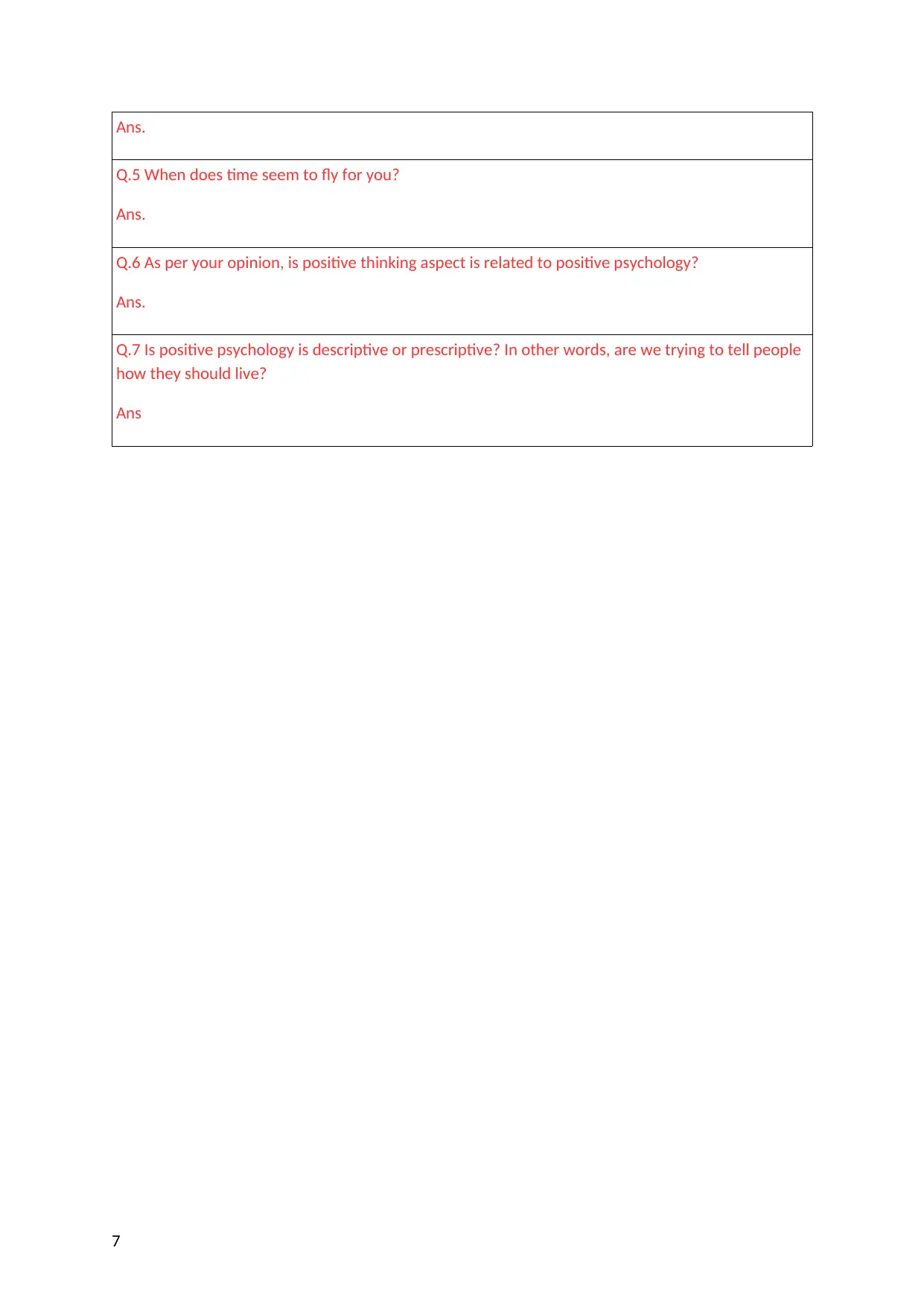
Ans.
Q.5 When does time seem to fly for you?
Ans.
Q.6 As per your opinion, is positive thinking aspect is related to positive psychology?
Ans.
Q.7 Is positive psychology is descriptive or prescriptive? In other words, are we trying to tell people
how they should live?
Ans
7
Q.5 When does time seem to fly for you?
Ans.
Q.6 As per your opinion, is positive thinking aspect is related to positive psychology?
Ans.
Q.7 Is positive psychology is descriptive or prescriptive? In other words, are we trying to tell people
how they should live?
Ans
7
Paraphrase This Document
Need a fresh take? Get an instant paraphrase of this document with our AI Paraphraser
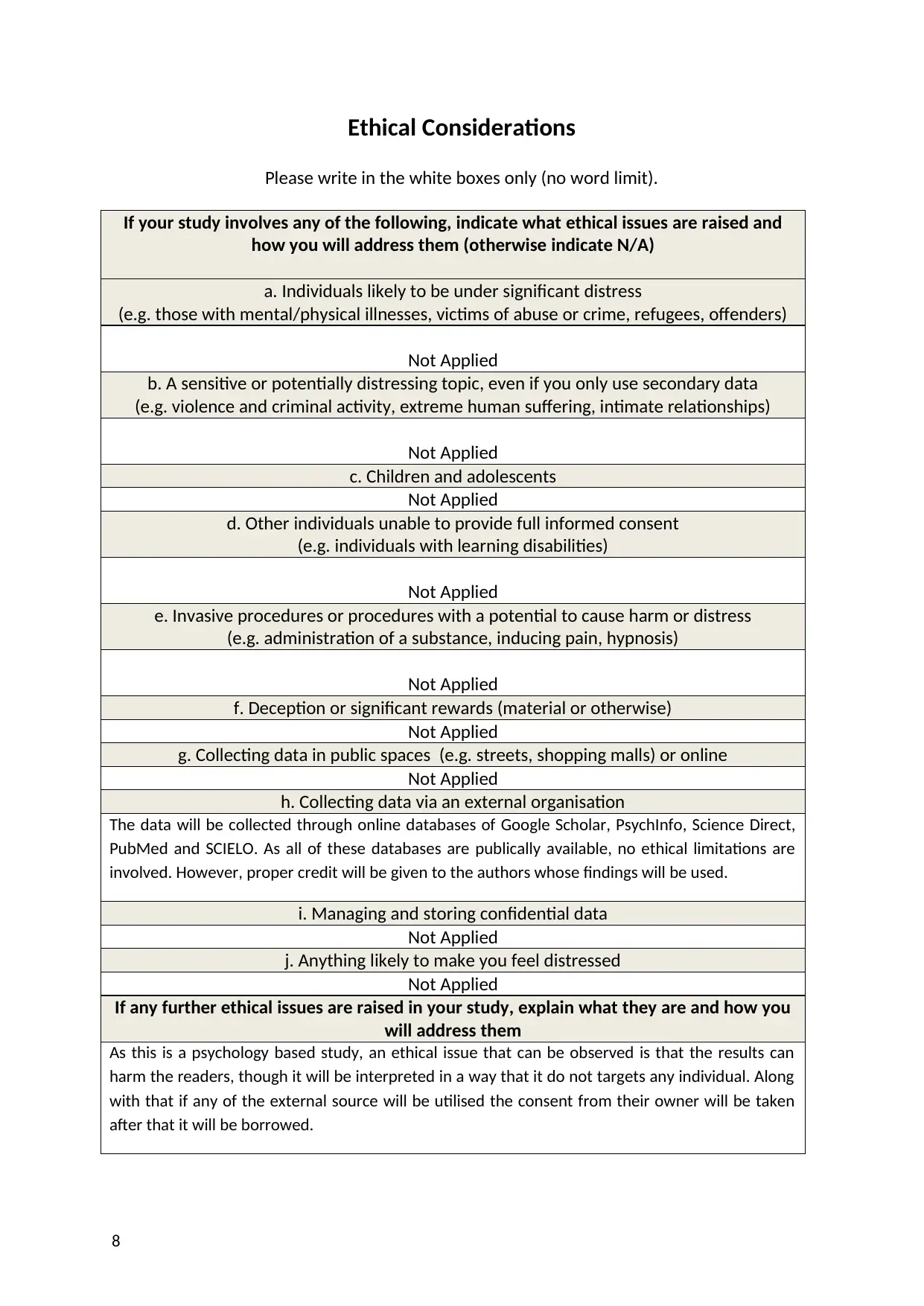
Ethical Considerations
Please write in the white boxes only (no word limit).
If your study involves any of the following, indicate what ethical issues are raised and
how you will address them (otherwise indicate N/A)
a. Individuals likely to be under significant distress
(e.g. those with mental/physical illnesses, victims of abuse or crime, refugees, offenders)
Not Applied
b. A sensitive or potentially distressing topic, even if you only use secondary data
(e.g. violence and criminal activity, extreme human suffering, intimate relationships)
Not Applied
c. Children and adolescents
Not Applied
d. Other individuals unable to provide full informed consent
(e.g. individuals with learning disabilities)
Not Applied
e. Invasive procedures or procedures with a potential to cause harm or distress
(e.g. administration of a substance, inducing pain, hypnosis)
Not Applied
f. Deception or significant rewards (material or otherwise)
Not Applied
g. Collecting data in public spaces (e.g. streets, shopping malls) or online
Not Applied
h. Collecting data via an external organisation
The data will be collected through online databases of Google Scholar, PsychInfo, Science Direct,
PubMed and SCIELO. As all of these databases are publically available, no ethical limitations are
involved. However, proper credit will be given to the authors whose findings will be used.
i. Managing and storing confidential data
Not Applied
j. Anything likely to make you feel distressed
Not Applied
If any further ethical issues are raised in your study, explain what they are and how you
will address them
As this is a psychology based study, an ethical issue that can be observed is that the results can
harm the readers, though it will be interpreted in a way that it do not targets any individual. Along
with that if any of the external source will be utilised the consent from their owner will be taken
after that it will be borrowed.
8
Please write in the white boxes only (no word limit).
If your study involves any of the following, indicate what ethical issues are raised and
how you will address them (otherwise indicate N/A)
a. Individuals likely to be under significant distress
(e.g. those with mental/physical illnesses, victims of abuse or crime, refugees, offenders)
Not Applied
b. A sensitive or potentially distressing topic, even if you only use secondary data
(e.g. violence and criminal activity, extreme human suffering, intimate relationships)
Not Applied
c. Children and adolescents
Not Applied
d. Other individuals unable to provide full informed consent
(e.g. individuals with learning disabilities)
Not Applied
e. Invasive procedures or procedures with a potential to cause harm or distress
(e.g. administration of a substance, inducing pain, hypnosis)
Not Applied
f. Deception or significant rewards (material or otherwise)
Not Applied
g. Collecting data in public spaces (e.g. streets, shopping malls) or online
Not Applied
h. Collecting data via an external organisation
The data will be collected through online databases of Google Scholar, PsychInfo, Science Direct,
PubMed and SCIELO. As all of these databases are publically available, no ethical limitations are
involved. However, proper credit will be given to the authors whose findings will be used.
i. Managing and storing confidential data
Not Applied
j. Anything likely to make you feel distressed
Not Applied
If any further ethical issues are raised in your study, explain what they are and how you
will address them
As this is a psychology based study, an ethical issue that can be observed is that the results can
harm the readers, though it will be interpreted in a way that it do not targets any individual. Along
with that if any of the external source will be utilised the consent from their owner will be taken
after that it will be borrowed.
8

9
⊘ This is a preview!⊘
Do you want full access?
Subscribe today to unlock all pages.

Trusted by 1+ million students worldwide

Appendix 1
Detailed presentation of the research instruments used (e.g. an interview schedule).
No research instruments will be used, the data will be collected via secondary sources using
thematic research.
10
Detailed presentation of the research instruments used (e.g. an interview schedule).
No research instruments will be used, the data will be collected via secondary sources using
thematic research.
10
Paraphrase This Document
Need a fresh take? Get an instant paraphrase of this document with our AI Paraphraser
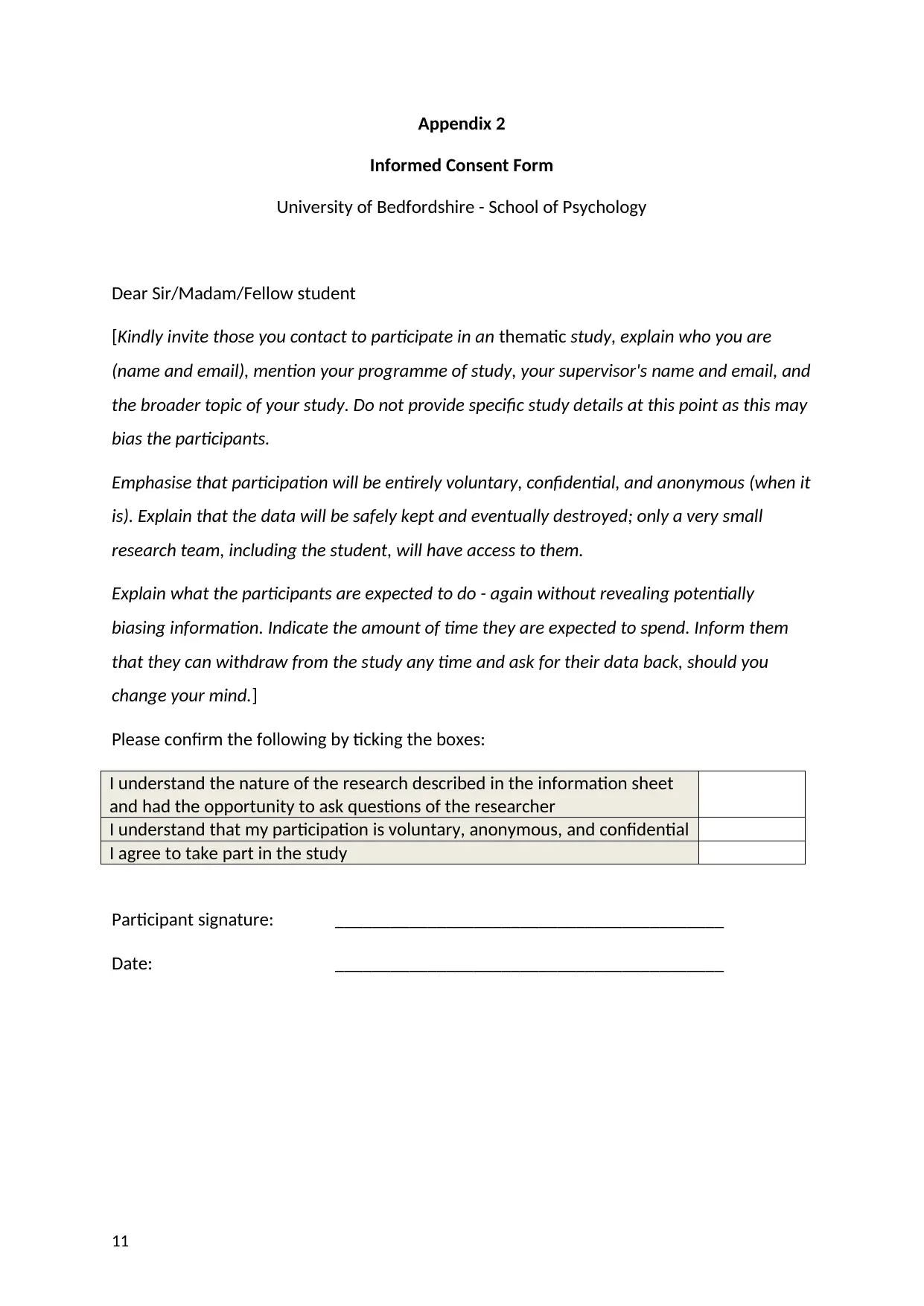
Appendix 2
Informed Consent Form
University of Bedfordshire - School of Psychology
Dear Sir/Madam/Fellow student
[Kindly invite those you contact to participate in an thematic study, explain who you are
(name and email), mention your programme of study, your supervisor's name and email, and
the broader topic of your study. Do not provide specific study details at this point as this may
bias the participants.
Emphasise that participation will be entirely voluntary, confidential, and anonymous (when it
is). Explain that the data will be safely kept and eventually destroyed; only a very small
research team, including the student, will have access to them.
Explain what the participants are expected to do - again without revealing potentially
biasing information. Indicate the amount of time they are expected to spend. Inform them
that they can withdraw from the study any time and ask for their data back, should you
change your mind.]
Please confirm the following by ticking the boxes:
I understand the nature of the research described in the information sheet
and had the opportunity to ask questions of the researcher
I understand that my participation is voluntary, anonymous, and confidential
I agree to take part in the study
Participant signature: __________________________________________
Date: __________________________________________
11
Informed Consent Form
University of Bedfordshire - School of Psychology
Dear Sir/Madam/Fellow student
[Kindly invite those you contact to participate in an thematic study, explain who you are
(name and email), mention your programme of study, your supervisor's name and email, and
the broader topic of your study. Do not provide specific study details at this point as this may
bias the participants.
Emphasise that participation will be entirely voluntary, confidential, and anonymous (when it
is). Explain that the data will be safely kept and eventually destroyed; only a very small
research team, including the student, will have access to them.
Explain what the participants are expected to do - again without revealing potentially
biasing information. Indicate the amount of time they are expected to spend. Inform them
that they can withdraw from the study any time and ask for their data back, should you
change your mind.]
Please confirm the following by ticking the boxes:
I understand the nature of the research described in the information sheet
and had the opportunity to ask questions of the researcher
I understand that my participation is voluntary, anonymous, and confidential
I agree to take part in the study
Participant signature: __________________________________________
Date: __________________________________________
11
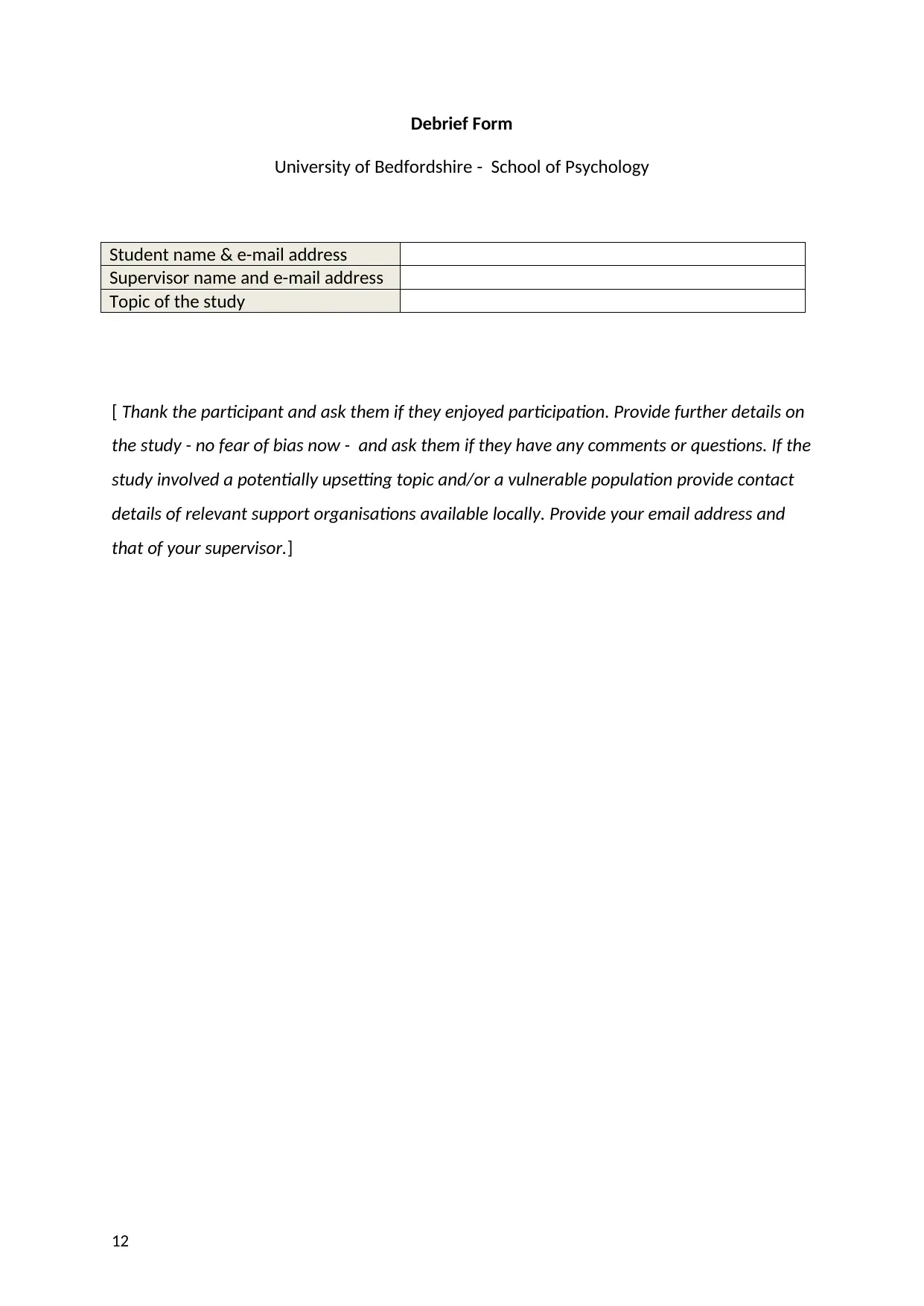
Debrief Form
University of Bedfordshire - School of Psychology
Student name & e-mail address
Supervisor name and e-mail address
Topic of the study
[ Thank the participant and ask them if they enjoyed participation. Provide further details on
the study - no fear of bias now - and ask them if they have any comments or questions. If the
study involved a potentially upsetting topic and/or a vulnerable population provide contact
details of relevant support organisations available locally. Provide your email address and
that of your supervisor.]
12
University of Bedfordshire - School of Psychology
Student name & e-mail address
Supervisor name and e-mail address
Topic of the study
[ Thank the participant and ask them if they enjoyed participation. Provide further details on
the study - no fear of bias now - and ask them if they have any comments or questions. If the
study involved a potentially upsetting topic and/or a vulnerable population provide contact
details of relevant support organisations available locally. Provide your email address and
that of your supervisor.]
12
⊘ This is a preview!⊘
Do you want full access?
Subscribe today to unlock all pages.

Trusted by 1+ million students worldwide
1 out of 13
Related Documents
Your All-in-One AI-Powered Toolkit for Academic Success.
+13062052269
info@desklib.com
Available 24*7 on WhatsApp / Email
![[object Object]](/_next/static/media/star-bottom.7253800d.svg)
Unlock your academic potential
Copyright © 2020–2025 A2Z Services. All Rights Reserved. Developed and managed by ZUCOL.





